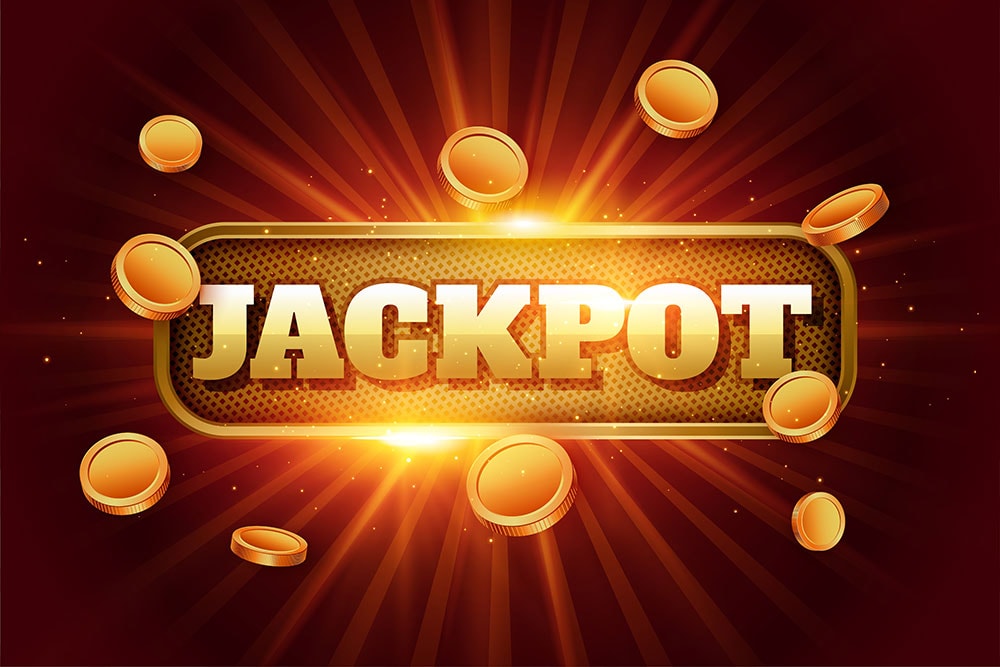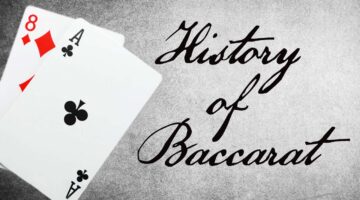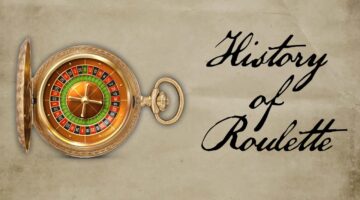The Origins and History of Blackjack
- By: Sean van der Merwe on October 26, 2021
- Categories: Gaming
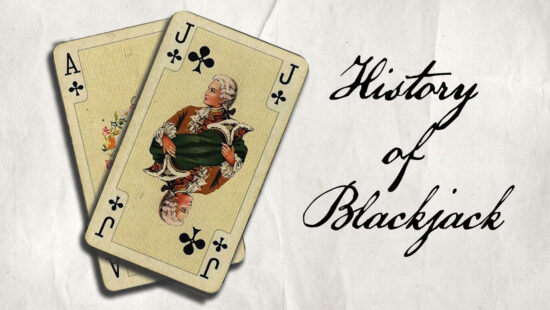
Gambling is one of the oldest pastimes, traceable back to the earliest written records of human history. Since, its inception, the types of games played, along with the paraphernalia used to play them has seen a vast evolution and growth.
The crudest methods of gaming included bone/wooden dice and other simple accessories. It wasn’t until the inception of playing cards in Europe in the 1370s that an explosive variety of games made their way onto the scene. Even to this day, card games dominate the casino floors, bringing entertainment to millions every year. One of the most prolific games of the lot is blackjack.
As one of the most popular card games in the world, we know that there is a certain extent of curiosity surrounding how the game came into being. As such, we have put our expert PokCas investigative team to work with the task of discovering all the important facts surrounding blackjack table game history.
Explore the content of our article below for a full overview of blackjack table game history, covering vital information about what the game is all about, where it originated, how it evolved into the modern game, and what its closest ancestors are. If you are someone who likes to invest themselves in their hobbies, then this article is sure to help you relate better to your love for playing blackjack.
What is Blackjack?
Before we take a detailed look into blackjack history and dig up the past, it’s best if you know a little more about the game we are covering.
Blackjack is a card game that is often associated with gambling and casino gaming. Also known as “Twenty-One” or “Pontoon”, the basic premise of the gameplay is rather simple. Each player at the table competes directly against the dealer. The objective is to land a hand with a value closer to 21 than the dealer without going over (bust).
Unlike slots and roulette games, the outcomes of the round rely quite heavily on skill. While the first two-card hand you receive is randomly selected, the following decisions you make with regards to either splitting, doubling, hitting, or staying have a profound impact on your success or failure that round. As such, it’s advisable that those looking to enjoy the game, learn more about the rules and strategy for blackjack to optimise their chances for wins.
The greatest drawcard to blackjack has got to be the minuscule house edge in the game. Depending on the blackjack variant, the house’s advantage could be as little as 0.5%. That makes it the casino title with the best chance of success if you play at optimum strategy. As such, the odds on the game are not hugely enticing. A standard win will earn you 1:1, while a natural blackjack hand (21) will earn you 3:2. There is a chance of increasing the stakes if you play side bets, but every strategist knows that these are, more often than not, a waste of your time and money.
Now that you have a pretty good picture of the game, as a whole, let’s explore blackjack game history in more depth.
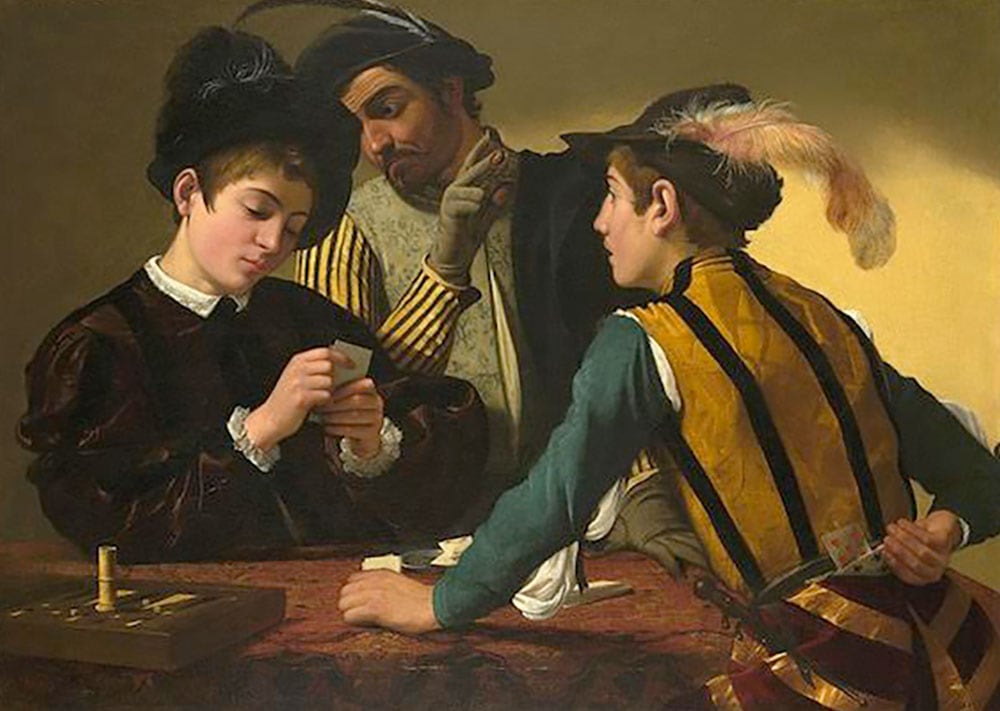
The Cardsharpps, by Caravaggio,c 1594
Blackjack Game History – The Origins of Twenty-One
Blackjack history is a little unclear and the origin of the game is still a topic of debate to this day. There is a school of thought that believes that the game started in ancient Rome. Of course, this predates the inception of the first paper playing cards, so it’s assumed that it played out on painted wooden blocks instead. Unfortunately, there is no proof to confirm that this is the case.
French Influence on Blackjack History
Most hardcore researchers tend to agree that blackjack history was most likely to originate in France in the 1700s. It may have been an adaptation of the prominent French Game, “Chemin de Fer”. Originally named “Vingt-et-Un” (Twenty-One), its journey to its current blackjack status is an interesting one. If this blackjack game history is accurate, then the title has a strong pedigree of over 300 years.
Of course, both historical theories need not be incorrect. If there is anything to learn from history, it’s that human beings tend to take past ideas and improve upon them. Just because is more logical to assume that Blackjack originated in the 1700s, doesn’t mean that we should discount the fact that it could be the brainchild of an ancient game with a similar premise that managed to survive the era of Medieval gaming.
One thing we do know is that the game of Vingt-et-Un was most assuredly present in the mid-1700s, as there are records of it being played in the palace of King Louis XV.
Crossing the Divide from Blackjack Game History to Blackjack Present
As French colonists made their way across the globe, we find traces of the game popping up in England and the United States. It remained known as the game of “twenty-one” throughout the course of the 1800s.
By the time World War One came about, twenty-one had evolved into Pontoon. It seems that the name changed began as Vontoon (a phonetic derivative of Vingt-Un) before the British put their mark on the game by replacing the “V” with a “P”. Pontoon remains the term for the British version of blackjack. The term became so synonymous with 21, that they named a prison sentence after it in the UK. Where a convicted felon receives either 21 months or 21 years in prison, the legislature might refer to it as a Pontoon.
French settlers introduced the game to North America in the 18th Century, where it remained a household game for one hundred years. In fact, twenty-one picked up in popularity in the 1800s and was prominent at legalized gambling halls and casinos as early as 1820. However, the rules differed slightly in the early blackjack game history of America. One of the most notable changes was made to the rule on “doubling”. In blackjack’s infancy, only the dealer could double a hand. Thankfully, the evolution of the game changed to offer the option to players, exclusively.
20th Century Casino Culture
In keeping with the form of blackjack history, the game would continue to evolve and morph throughout the 20th Century. It was during this era that the final name change to “blackjack” occurred. As the game grew significantly in the US, the need to promote it commercially became apparent. At the time, a bonus jackpot payout was available to players who mustered 21 with an ace and a blackjack. While the bonus eventually petered away, the name stuck and twenty-one received its rebranding as “Blackjack”.
The game and its rules became formalized in Nevada, by the Nevada Gaming Commission, and are still used to this very day.
Blackjack History Legal Climate
Like all forms of gambling, Blackjack has had its run-ins with the law. While the game was thriving in the USA in the 19th Century, it was under lock and key in France, along with roulette and other games of chance. It has remained unscathed in Nevada, but some of the US states banned chance-based games (including blackjack) thanks to the conservative voice in each region.
It seems like a ridiculous notion to ban blackjack along with other chance-based games. After all, it is hugely dependent on skill and decision-making. Like poker, it should be more openly accepted. While online poker rooms thrive in even the most rigid of gaming regions, blackjack is lumped with the rest on the ban list. Fortunately, big inroads are underway in America and beyond when it comes to the tolerance of online and land-based gambling.
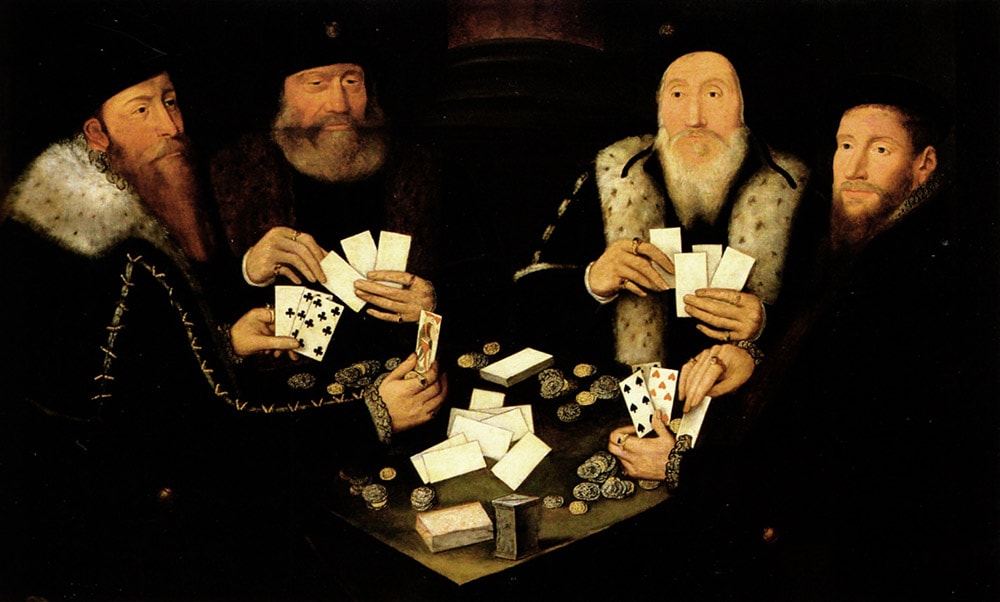
From the book: What Life was Like in the Realm of Elizabeth: England 1533-1603. pp 40-41
Blackjack’s Ancestry
There is a good chance that blackjack originally evolved from various game options of the past. I
1. Chemin de Fer
Also a relative of the famous Italian game, Baccarat, many believe that Chemin de Fer (Shimmy) may have been an inspiration to the French in the development of Vingt-et-Un. In Shimmy, the aim of the game is to get a hand as close to nine as possible. While we can see where the strain of thinking comes from, when you compare the two games together today, there are some vast differences in the gameplay.
2. French Ferme
Translated as “French Farmer”, the game requires its players to compete against each other by trying to get the hand closest to 16. For every point they go over 16, they pay a penalty to the farmer (banker). The hand closest to 16 wins the entire pool. The farmer cannot claim the pool, only the penalties. It is evident, right away, that it shares certain aspects with blackjack.
3. Trente Un
This Spanish game literally means “Thirty-One”. It is first mentioned in literature in 1440 and, therefore, precedes blackjack buy a few hundred years. It involves a table of 2 to 7 players, where each competitor tries to gain a hand closest to 31 from their initial three-card hand. Players continue to draw cards until they believe they can beat the table.
Players still enjoy Trent Un to this day. Many know it by its more common names. These include Big Tonka, Blitz, Nickel Knock, Scat, Cadillac, Cad, Whammy, Juble, and many more.
4. Sette eMezzo
Sette eMezzo stands for “seven and a half”in Italian. The game plays out with a 40-card deck with all the eights, nines, and tens removed. Like blackjack, you aim to beat the dealer to a certain score without going bust. Unlike blackjack, the goal is not to reach a value of 21, but rather a value of 7 and a half. All cards hold their face value, while royal face cards count toward ½ a point in value, each.
5. Quinze
This is a game similar to vingt-et-un, however, the player must aim to make 15 and not 21. Also known as Ace-Low, it is a 17th Century title of Spanish origin played between 2 players (one is the dealer) with a 52-card pack. Each player receives one card and can then decide whether they want more cards or not. If they exceed a value of 15 in their hand before their opponent plays, they lose. As such, the dealer always has the edge in the game.
Top Wins in Blackjack History
As a popular game at both land-based and online casinos, you can expect that there have been some impressive wins over the years. We don’t have an exact archive of all the wins spanning its 300-year history though. Below is a list of some of the most notable wins in recent blackjack game history.
1. Kerry Packer wins $40 Million
The MGM Grand doled out $40 million in prize money to Kerry Packer in 1995. The high rolling blackjack expert wagered a whopping $2 million over 8 hands at $250,000 per hand. Just over half an hour later, he multiplied his total spend by a ridiculous 20x, making him the biggest blackjack winner in world history.
2. The Bill Kaplan Student Team
You may have watched the movie, “21”. But, perhaps you weren’t aware that it was based on a true story. Professor Kaplan and a team of 80 students from various universities in the US won between $50 and $100 million in cash over a series of nights in Atlantic City, New Jersey. The winnings were allegedly shared amongst the players.
3. UFC Boss – Dana White
Not only is Dana White a budding entrepreneur and tycoon, but he is a respected blackjack gambler, too. A single sitting at the Palms Hotel in Las Vegas won the UFC boss $7 million in cash. That came off the back of a 5-month winning streak earning him multiple millions of dollars more in return. Unfortunately for Mr. White, his winning ways ended in casino bans across several hotels on the strip.
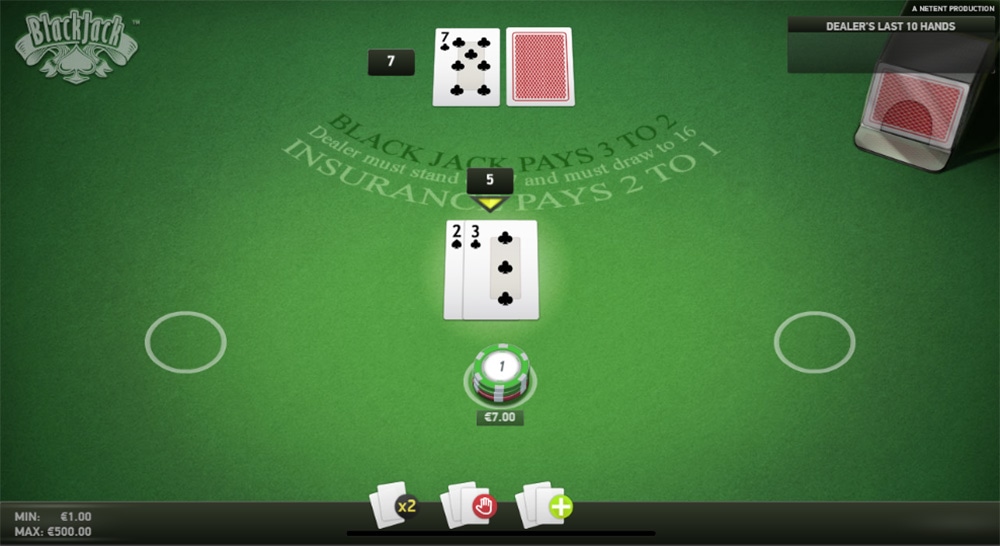
Online Virtual Blackjack. Image Courtesy of NetEnt
Modern Day Blackjack
Vegas rules still provide the basis for entertainment at most land-based casinos around the world. Very little has changed across blackjack history as far as technology is concerned unless you count the introduction of automated shuffling machines.
The most notable step up can be seen in the evolution of blackjack from the physical game to the online casino title. With advancements in technology, you can play a round of real money blackjack from your mobile or desktop from the convenience of your sitting room, office, or car. Virtual video game renderings allow you to play in privacy against the house, alone.
Those who love the authentic social gameplay evident from the earliest blackjack history can still enjoy the convenience of playing from home. Try live dealer casino gaming on your phone or computer. Here, live dealers host the games via live stream to a multi-player lobby that can socialize freely via a state-of-the-art chat portal.
There is very little chance that the inventors of the game foresaw the lengths that vingt-et-un would progress in so many years. It leaves us with the hope that perhaps more innovative game options may evolve in the future. If there is anything that blackjack history tells us, it’s that it is certainly a possibility.

